Related Research Articles
Malcolm III was King of Scotland from 1058 to 1093. He was later nicknamed "Canmore". Malcolm's long reign of 35 years preceded the beginning of the Scoto-Norman age. Henry I of England and Eustace III of Boulogne were his sons-in-law, making him the maternal grandfather of Empress Matilda, William Adelin and Matilda of Boulogne. All three of them were prominent in English politics during the 12th century.

Richard I, known as Richard Cœur de Lion or Richard the Lionheart because of his reputation as a great military leader and warrior, was King of England from 1189 until his death in 1199. He also ruled as Duke of Normandy, Aquitaine, and Gascony; Lord of Cyprus; Count of Poitiers, Anjou, Maine, and Nantes; and was overlord of Brittany at various times during the same period. He was the third of five sons of Henry II of England and Eleanor of Aquitaine and was therefore not expected to become king, but his two elder brothers predeceased their father.

Berengaria of Navarre was Queen of England as the wife of Richard I of England. She was the eldest daughter of Sancho VI of Navarre and Sancha of Castile. As is the case with many of the medieval English queens, little is known of her life.
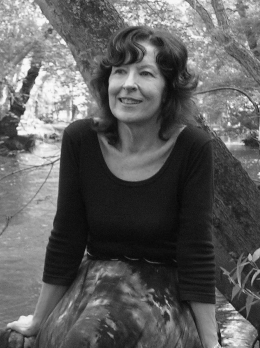
Sharon Kay Penman was an American historical novelist, published in the UK as Sharon Penman. She was best known for the Welsh Princes trilogy and the Plantagenet series. In addition, she wrote four medieval mysteries, the first of which, The Queen's Man, was a finalist in 1996 for the Best First Mystery Edgar Award.
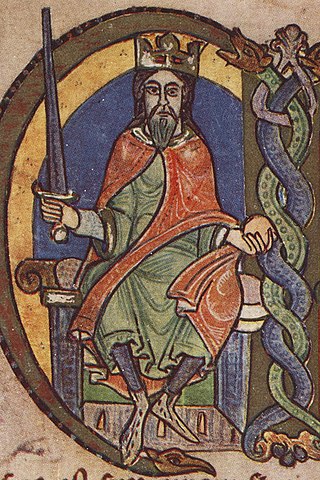
David I or Dauíd mac Maíl Choluim was a 12th-century ruler and saint who was Prince of the Cumbrians from 1113 to 1124 and later King of Scotland from 1124 to 1153. The youngest son of Malcolm III and Margaret of Wessex, David spent most of his childhood in Scotland, but was exiled to England temporarily in 1093. Perhaps after 1100, he became a dependent at the court of King Henry I of England, by whom he was influenced.
Glastonbury Tor is a tor near Glastonbury in the English county of Somerset, topped by the roofless St Michael's Tower, a Grade I listed building. The site is managed by the National Trust and has been designated a scheduled monument. The Tor is mentioned in Celtic mythology, particularly in myths linked to King Arthur, and has several other enduring mythological and spiritual associations.
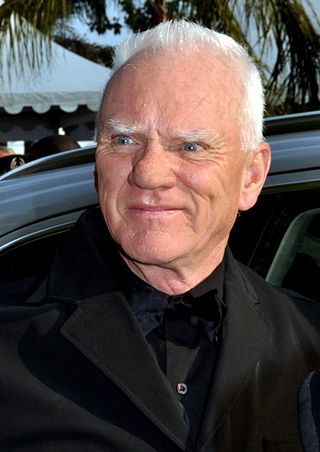
Malcolm McDowell is an English actor. He first became known for portraying Mick Travis in Lindsay Anderson's if.... (1968), a role he later reprised in O Lucky Man! (1973) and Britannia Hospital (1982). His performance in if.... prompted Stanley Kubrick to cast him as Alex in A Clockwork Orange (1971), the role for which McDowell became best known.

Bayeux is a commune in the Calvados department in Normandy in northwestern France.

Château Gaillard is a medieval castle ruin overlooking the River Seine above the commune of Les Andelys, in the French department of Eure, in Normandy. It is located some 95 kilometres (59 mi) north-west of Paris and 40 kilometres (25 mi) from Rouen. Construction began in 1196 under the auspices of Richard the Lionheart, who was simultaneously King of England and feudal Duke of Normandy. The castle was expensive to build, but the majority of the work was done in an unusually short period of time. It took just two years and, at the same time, the town of Petit Andely was constructed. Château Gaillard has a complex and advanced design, and uses early principles of concentric fortification; it was also one of the earliest European castles to use machicolations. The castle consists of three enclosures separated by dry moats, with a keep in the inner enclosure.
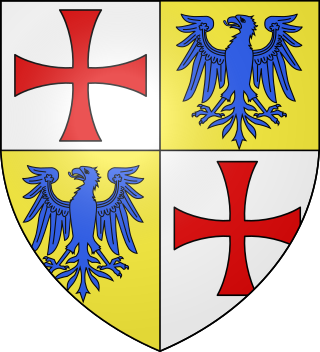
Robert IV de Sablé was Lord of Sablé, the eleventh Grand Master of the Knights Templar from 1191 to 1192 and Lord of Cyprus from 1191 to 1192. He was known as the Grand Master of the Knights Templars and the Grand Master of the Holy and Valiant Order of Knights Templars.
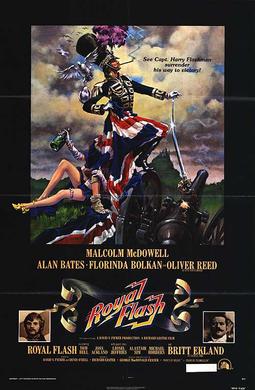
Royal Flash is a 1975 British adventure comedy film based on the second Flashman novel by George MacDonald Fraser. It stars Malcolm McDowell as Flashman. Additionally, Oliver Reed appeared in the role of Otto von Bismarck, Alan Bates as Rudi von Sternberg, and Florinda Bolkan played Lola Montez. Fraser wrote the screenplay and the film was directed by Richard Lester.
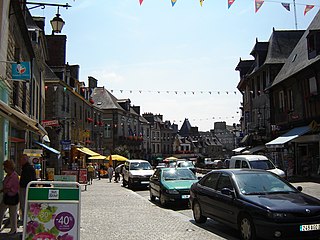
Dol-de-Bretagne, cited in most historical records under its Breton name of Dol, is a commune in the Ille-et-Vilaine département in Brittany in northwestern France.

Princess of Thieves is a romantic adventure television film starring Keira Knightley, produced by Granada Productions, and premiered on ABC's The Wonderful World of Disney in the United States in 2001. Co-starring in the film are Stuart Wilson as Robin Hood, Stephen Moyer as Prince Philip, Jonathan Hyde as Prince John and Malcolm McDowell as the Sheriff. The movie was directed by Peter Hewitt and filmed in Romania. The film's plotline draws inspiration from the classic Robin Hood legend, which has been adapted many times for screen.

The Crusades is a 1935 American historical adventure drama film directed and produced by Cecil B. DeMille for Paramount Pictures, loosely based on the life of King Richard I of England during the Third Crusade, and his marriage to Berengaria of Navarre. The film stars Henry Wilcoxon as Richard, Loretta Young as Berengaria, and Ian Keith as Saladin, along with C. Aubrey Smith, Katherine DeMille, Joseph Schildkraut and Alan Hale Sr. in supporting roles.

The Kingdom of Alba was the Kingdom of Scotland between the deaths of Donald II in 900 and of Alexander III in 1286. The latter's death led indirectly to an invasion of Scotland by Edward I of England in 1296 and the First War of Scottish Independence.

Richard I of England has been depicted many times in romantic fiction and popular culture.

Château de Chinon is a château located on the bank of the river Vienne in Chinon, France. It was founded by Theobald I, Count of Blois. In the 11th century the castle became the property of the counts of Anjou. In 1156 Henry II of England, a member of the House of Anjou, took the castle from his brother Geoffrey, Count of Nantes, after Geoffrey rebelled for a second time. Henry favoured the Château de Chinon as a residence. Most of the standing structure can be attributed to his reign; he died there in 1189.

Devil's Brood is a historical novel written by Sharon Kay Penman, published in 2008, and is the third volume in her Plantagenet series, preceded by When Christ and His Saints Slept and Time and Chance, and followed by Lionheart (2011).

Peveril Castle is a ruined 11th-century castle overlooking the village of Castleton in the English county of Derbyshire. It was the main settlement of the feudal barony of William Peverel, known as the Honour of Peverel, and was founded some time between the Norman Conquest of 1066 and its first recorded mention in the Domesday Survey of 1086, by Peverel, who held lands in Nottinghamshire and Derbyshire as a tenant-in-chief of the king. The town became the economic centre of the barony. The castle has views across the Hope Valley and Cave Dale.

The Angevin kings of England were Henry II and his sons, Richard I and John, who ruled England from 1154 to 1216. With ancestral lands in Anjou, they were related to the Norman kings of England through Matilda, the daughter of Henry I, and Henry II's mother. They were also related to the earlier Anglo-Saxon kings of England through Matilda's great-great-great grandfather, Aethelred the Unready. Their descendants, the main line of Plantagenets, continued to rule England until 1485; some historians make no distinction between the Angevins and the Plantagenets, while others name John's son Henry III the first Plantagenet king.
References
Citations
- 1 2 "Richard The Lionheart". British Board of Film Classification . Retrieved 16 September 2013.
Bibliography
DUMONT, Hervé, Moyen Âge et Renaissance au cinéma. L'Angleterre (partie I), Paris, BoD, 2017, p. 77.